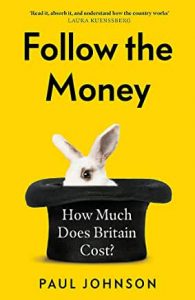I polished off in a couple of days Paul Johnson’s new book Follow the Money: How Much Does Britain Cost? The hugely-respected Director of the Institute for Fiscal Studies (who is a friend, to be transparent) has written a crystal-clear account of how the UK government raises revenues and how it spends them. Government expenditure is over £1 trillion, raising just over £900m in taxes, or four pounds in every ten earned. The big swallowers of money are health, social care and pensions. So this book (published later this month) is a huge service to citizens as we head towards the next general election within a couple of years.
Although a calm, even forensic, account of the unavoidable trade-offs and complexities in providing these facets of social insurance against the uncertainties of life, the book left me furious. It cites the wonderful The Blunders of Our Governments by Anthony King & Ivor Crewe, and could equally have cited the more recent Why Governments Get It Wrong by my colleague Dennis Grube. We know – don’t we – that governments do a lot of stupid things, badly. We’ve certainly had a run of these stupidities here in the UK: Brexit on the worst possible terms for internal party reasons, Liz Truss… Even so, to see collected in one place all the bad decisions concerning the fundamental well-being of citizens is angry-making. Any unavoidable choice that could be postponed has been, even at substantial long term cost. There have been obfuscations and lies. And it has been going on for years.
So here we are with an economy whose long term potential growth is heading down toward zero (1% a year for the next couple of years, the Bank of England reckons, down from 1.7% in 2010-1019). The extent of inequality is shocking. As Simon Tilford noted in a recent essay, most of the people taking decisions have no idea about the lives of those they exercise control over, about how badly off most of their compatriots are. The over-burdened welfare state is not quite coping with people suffering from what (I learned here) doctors describe as “Shit Life Syndrome” when they go to their GPs for help with depression or other mental ill-health conditions. And there will not be enough money to fix any of this unless growth picks up. But that would require a competent, effective government able to take clear decisions, build cross-party consensus, devolve money and powers, and stick with the plan without changing ministers and policies every 18 months.
Here’s hoping – but it’s been decades since we had that. And for another couple of years this corrupt, internally-riven, and ineffective government is likely to cling on. Meanwhile, read the book, which urges us not to despair, but ends: “We can, and must, do better.”


Pingback: Juste colère | L'économiste éclairé - See3in News
Pingback: Righteous anger | The Illuminated Economist - News-dojpro
Pingback: Ira justa | El economista ilustrado - A7 news
Pingback: Righteous anger | The Enlightened Economist - CrediReview
Pingback: Righteous anger | The Enlightened Economist - Dinero Post
Pingback: Righteous anger | The Enlightened Economist - Feed Dollar
Are there any comparable books on the US economy, which I would imagine is even more depressing. I haven’t been able to find any books like this.
I don’t know of anything directly comparable but this is a useful read: http://www.enlightenmenteconomics.com/blog/index.php/2021/08/taxation-made-fun/